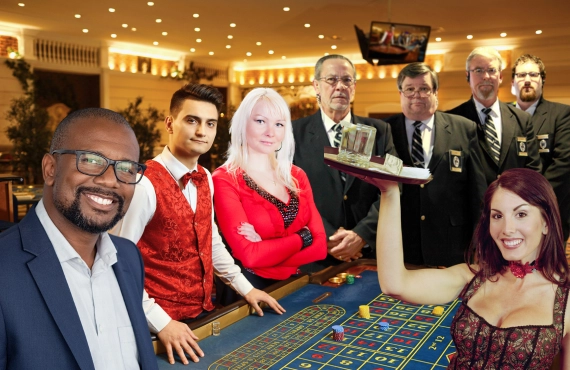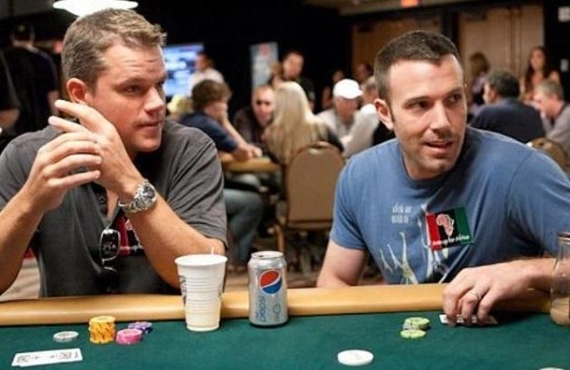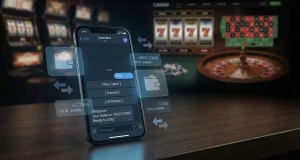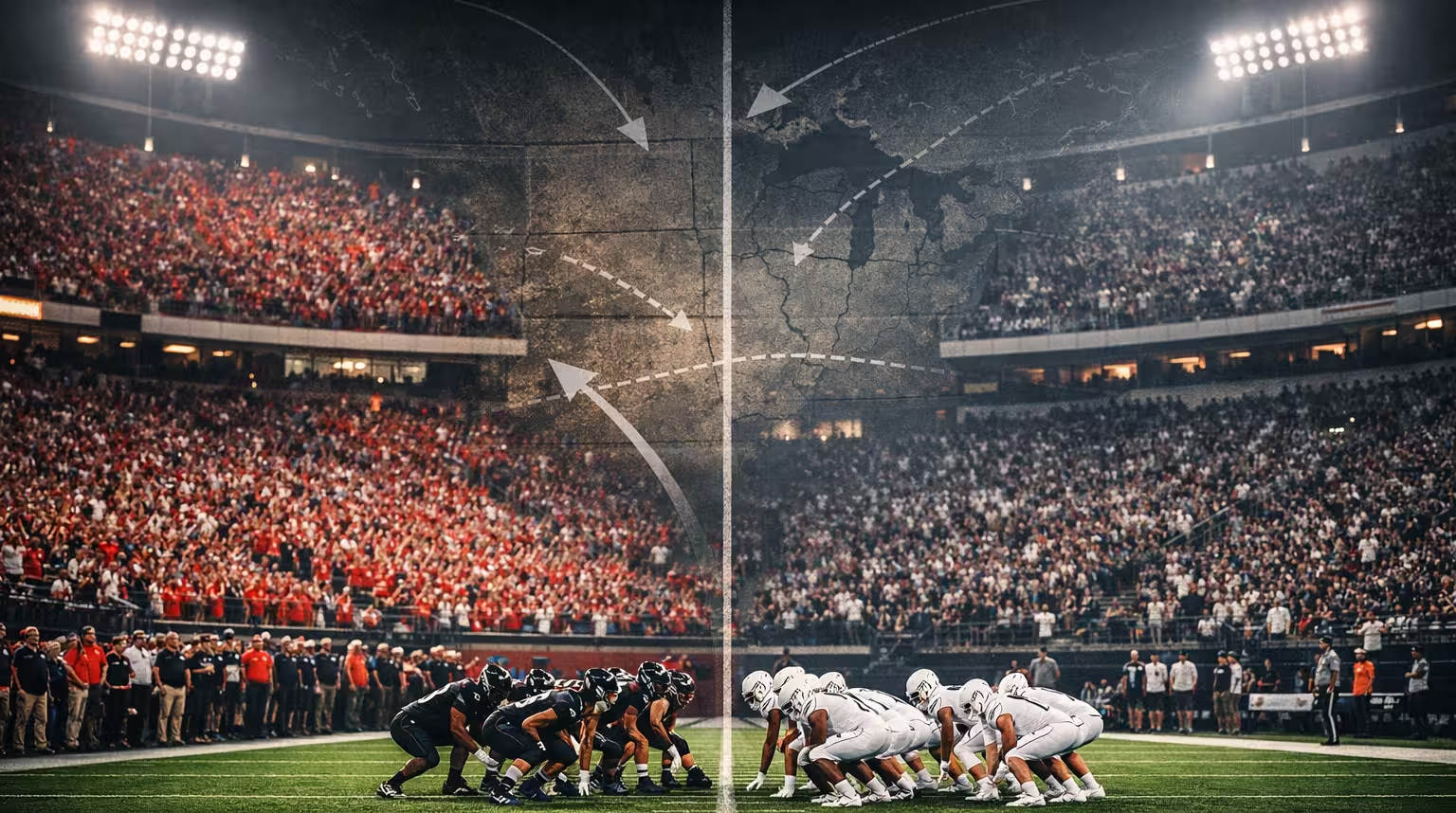Behind the Scenes: What It’s Like Working in a Casino

In the 1998 indie film Croupier, Clive Owen plays Jack Manfred, an aspiring writer who takes a job as a croupier in a London casino to make ends meet. The movie, directed by Mike Hodges, is a look into the life of a casino worker, exploring the seedy, high-stakes environment that is hidden from the casual gambler’s view. Jack’s experiences in the casino become the inspiration for his novel, blurring the lines between his professional and personal lives.
Understanding the behind-the-scenes dynamics of a casino, as depicted in Croupier, can give players a better appreciation of the complexities and high-pressure scenarios casino employees face daily. The movie highlights how the roles of croupiers, pit bosses, and other staff are crucial in maintaining the flow and fairness of the games so that every player is happy—at least until they lose money.
Although the story in Croupier is pretty far removed from reality, it does come into play for a look behind the scenes to show you what it takes to make a casino run like a well-oiled machine. From the dealers to the pit bosses, we’ll break down the roles and responsibilities that keep the casino floor going.
There is a meticulous orchestration of staff and strategies that make every game run efficiently so players can have a great time. So, let’s uncover what it’s really like to work in a casino and how it all comes together!
The Different Roles in a Casino
Casinos are busy environments with a lot of working parts to maintain smooth operations. From the tables to the surveillance room, each role contributes to creating an efficient and secure experience for guests. Let’s dig into all of the different positions within a casino and understand their responsibilities, skills required, and any necessary training processes.
Dealers and Croupiers
Dealers, also known as croupiers in European casinos, are central figures on the gaming floor. They are responsible for running table games such as blackjack, poker, and roulette. Their primary duties include handling bets, dealing cards or spinning that roulette wheel, and maintaining fair play.
Responsibilities
- Operating table games efficiently.
- Interacting with players, explaining game rules, and answering questions.
- Upholding the integrity of the games and adherence to casino rules.
Skills Required
- Math Proficiency: Dealers must quickly and accurately handle large sums of money and calculate payouts.
- Excellent Customer Service: A friendly and professional demeanor is a must for interacting with every type of clientele.
- Quick Decision-Making: Dealers need to make swift decisions to keep the game flowing smoothly and handle any issues that arise.
Training Process
Becoming a dealer typically involves completing a training program, which can last from several weeks to a few months, depending on the casino and the complexity of the games. These programs include both classroom instruction and hands-on practice. Trainees learn game rules, dealing techniques, and customer service skills. After completing the training, prospective dealers often need to pass a certification exam to demonstrate their proficiency and understanding of the casino’s operational standards.

Pit Bosses and Floor Supervisors
Pit bosses and floor supervisors play a big part in the effective operation of a casino—they are the managerial backbone of the gaming floor, making sure that everything runs efficiently and fairly.
Responsibilities
- Overseeing Table Games: Pit bosses and floor supervisors monitor all table games to ensure they are conducted according to casino rules and regulations. They keep an eye on dealers and players, making sure games are conducted fairly for all participants.
- Managing Dealers: They are responsible for supervising dealers, providing guidance, and ensuring they follow proper procedures. This includes scheduling shifts, offering feedback, and addressing any performance issues that arise.
- Resolving Disputes: When conflicts occur, whether between players or involving a dealer, pit bosses, and floor supervisors step in to resolve these disputes swiftly and fairly. Their decision-making skills are crucial in maintaining a harmonious gaming environment.
Importance of the Role
- Maintaining Integrity: Pit bosses and floor supervisors uphold the integrity of the gaming floor by verifying that all games are played honestly and by the rules. This includes preventing cheating and addressing any and all suspicious or shady activities.
- Operational Flow: They manage the flow of operations, making sure that games proceed without interruptions. This involves coordinating with various departments and staff members to handle any issues that might arise.
Security Personnel
The security personnel in a casino are critical for maintaining a safe and fair environment—their duties encompass a range of tasks designed to protect both players and staff and to uphold the integrity of the casino’s operations.
Responsibilities
- Monitoring for Cheating: Security staff are vigilant in detecting and preventing cheating. They observe players and dealers to identify any suspicious behavior and take appropriate action to uphold the fairness of the games.
- Player and Staff Safety: They are responsible for the safety of everyone in the casino. This includes responding to emergencies, managing disorderly conduct, and providing first aid when necessary.
- Handling Incidents: Security personnel are the first responders to incidents such as disputes, accidents, or any other issues that arise on the casino floor. They manage these situations and coordinate with law enforcement when needed.
Tools and Technology
- Surveillance Systems: Advanced surveillance systems, including CCTV cameras and facial recognition technology, are all necessary tools for security personnel. These systems help monitor the gaming floor and other areas, allowing security staff to detect suspicious activities quickly.
- Security Protocols: Security staff follow strict protocols, including regular patrols, monitoring entrances and exits, and verifying the credentials of staff and visitors. They use communication devices to stay in constant contact and respond promptly to any issues.
Hospitality Staff (Waitstaff, Bartenders, Chefs)
Hospitality is everything in a casino experience, especially if you’re staying at a luxury resort! So these staff members play one of the biggest roles in creating a welcoming and enjoyable atmosphere for guests. These positions include waitstaff, bartenders, and chefs, all of whom add to the overall experience.
Responsibilities
- Providing Food and Beverages: Hospitality staff are responsible for serving food and drinks to guests. Waitstaff takes orders, delivers meals, and makes sure that all guest needs are met during their dining experience. Bartenders mix and serve drinks, usually chatting it up with guests at the bar. Chefs prepare a variety of dishes with high culinary standards to please the guests.
- Ensuring a Pleasant Dining Experience: All hospitality staff aim to create a pleasant and memorable dining experience. This involves keeping a clean and inviting environment, providing prompt and courteous service, and addressing any guest concerns or special requests.
Interaction with Guests
- Enhancing the Overall Customer Experience: Hospitality staff are usually the first point of contact for guests, making their interaction important in shaping the guest’s overall experience. They’ll greet guests warmly, offer any dining or menu recommendations, and engage in friendly conversation to make guests feel welcome. Excellent customer service skills are a must for this role, as positive interactions with hospitality staff can make or break a guest’s visit to a casino.
Management and Administration
The management and administrative roles (aka the men in suits) in a casino are fundamental to its success and involve overseeing the strategic, financial, and operational aspects of the casino to make sure it runs smoothly—and makes a profit.
Responsibilities
- Strategic Planning: Casino managers are responsible for developing and implementing long-term strategies that match up with the casino’s goals. This includes market analysis, setting performance targets, and planning for expansion or new ventures.
- Financial Oversight: Effective financial management is obviously super important in a casino, and managers oversee budgets, financial reporting, and audits. They make sure that all financial operations comply with regulations and strive to maximize profitability while at the same time minimizing costs.
- Marketing: Marketing efforts are essential to attract new customers and retain existing ones. This includes advertising campaigns, promotions, and loyalty programs designed to improve the casino’s brand and appeal to a big audience.
Key Challenges
- Balancing Profitability with Customer Satisfaction: One of the primary challenges for casino management is finding the right balance between profitability and customer satisfaction. Managers have to see to it that the casino remains profitable while providing a high level of service and entertainment to guests. This often involves making difficult decisions about resource allocation and service offerings.
- Regulatory Compliance: Casinos operate under strict regulatory frameworks, and ensuring compliance with all legal and ethical standards is a constant challenge. This includes adhering to gaming laws and financial regulations and maintaining security protocols.
- Operational Efficiency: Managing the day-to-day operations of a casino involves coordinating various departments, from gaming to hospitality. Ensuring that all areas work together effortlessly to provide a positive guest experience while maintaining operational efficiency is a heavy responsibility.
A Day in the Life of Casino Staff
The daily routine for casino staff is dynamic and fast-paced, varying significantly depending on their role. Here’s a glimpse into what a typical workday looks like for different casino workers.
Shifts and Working Hours
| Staff Member | Details |
|---|---|
Dealers and Croupiers | They usually work rotating shifts that cover the casino’s operating hours, which can be 24/7. Shifts typically last 8 hours and can include nights, weekends, and holidays. Dealers need to be alert and engaging with players throughout their shift. |
Pit Bosses and Floor Supervisors | Generally work similar hours to dealers, often in overlapping shifts, to ensure management presence at all times. Their day includes overseeing the gaming floor, managing dealer rotations, and handling any disputes or issues that pop up. |
Security Personnel | Work in shifts that cover all hours of operation, guaranteeing constant surveillance and security. They might work longer shifts with more time off between, like 12-hour shifts. |
Hospitality Staff (Waitstaff, Bartenders, Chefs) | Typically work during peak dining and drinking hours, which can vary but often include evenings and weekends. Chefs will start to prepare food earlier, while waitstaff and bartenders clock in closer to meal and drink service times. |
Management and Administration | Often work more standard business hours but are on-call for issues that happen during off-hours. They might come in early or stay late to handle specific projects or busy periods. |
Preparation
| Task | Details |
|---|---|
Pre-Shift Briefings | Before starting their shift, casino staff usually attend briefings to get updates on any important information, such as VIP guests, new promotions, or any changes in procedures. This helps them get up to speed and ready for the day. |
Setting Up Tables and Machines | Dealers and croupiers set up their tables, making sure they have all the necessary supplies, like chips, cards, and other gaming equipment. They also check that everything is working properly. |
Security Checks | Security personnel conduct thorough checks of the surveillance equipment and security protocols to ensure they are operational and up to date. They also review any incidents from previous shifts. |
Hospitality Preparation | Chefs start by prepping ingredients and setting up their stations for the day. Waitstaff and bartenders make sure that the dining and bar areas are clean, stocked, and ready to serve guests. They also review any special menu items or promotions. |
Management Duties | Managers review reports, plan for the day’s operations, and coordinate with different departments to ensure all areas are ready for guests. They might also handle staffing issues, financial oversight, and strategic planning. |
On the Gaming Floor
The gaming floor of a casino is usually a super energetic and fun space, filled with the sounds of slot machines, the gasps and claps from winning tables, and the constant movement of guests and staff. The bright lights and ambiance are designed to create an exciting experience that keeps players entertained throughout their visit. The casino floor is where it all happens!
Interactions
- Dealing with Regulars: Regular customers often have their favorite games and dealers. Staff build relationships with these frequent visitors, greeting them by name and providing a personalized experience. This familiarity helps create a welcoming environment and encourages loyalty.
- Engaging First-Timers: First-time visitors might need guidance on how to play games or understand casino etiquette. Staff are trained to be approachable and helpful, giving instructions and answering questions to make newcomers feel more comfortable and confident. This positive interaction can really improve a first-timer’s experience and make them more likely to return.
Breaks and Downtime
Casinos are busy, so breaks and downtime are really important for sustaining the well-being and productivity of the staff. Here’s how casinos manage these aspects:
Scheduled Breaks
All casino employees are entitled to scheduled breaks, which include meal breaks and rest breaks. According to standard employee break policies, workers who are on the clock for more than six hours are given a 30-minute meal break, typically unpaid for non-exempt employees. Additionally, employees are allowed one paid 10-minute rest break for every four hours worked.

Employee Lounges
Casinos provide dedicated employee lounges designed to offer a comfy and relaxing environment for their staff during breaks. These lounges feature amenities like couches, coffee and snack stations, and entertainment options like TVs and games. The goal is to provide a space where employees can unwind and recharge away from the busy casino floor.
Activities
During these breaks, casino staff can partake in different activities to relax and recharge. Common activities include:
- Socializing: Employees often use break time to catch up with colleagues, fostering a sense of camaraderie and teamwork. You can find the smokers out back, catching some nicotine and chatting.
- Eating and Drinking: Having a meal or a snack is a common way for staff to refuel. Employee lounges have a fridge and microwave to store and heat food, as well as complimentary beverages like a Keurig or espresso machine.
- Relaxation: Lounges are equipped with comfortable seating areas where staff can rest. Some casinos also provide quiet areas for employees to relax without distractions.
- Entertainment: To help employees de-stress, some employee lounges have entertainment options like television, video games, or reading materials. And the more modern lounges have fitness equipment or meditation spaces to promote physical and mental well-being!
Challenges Faced
Working in a casino can mean coming up against some novel challenges, like high-stress situations and taxing physical demands. Here’s a closer look at these aspects:
High-Stress Situations
Casino staff frequently encounter high-stress situations involving difficult customers. These interactions can range from dealing with frustrated gamblers who are losing money to managing overly intoxicated guests. Have you ever had to talk down a drunk person who lost a lot of money? That sounds awful! But the staff has to remain calm, cool, collected, professional, and empathetic, using conflict resolution skills to de-escalate these kinds of tense situations. Effective communication and customer service skills are critical in these scenarios, as they help maintain a positive atmosphere on the gaming floor.
Maintaining Concentration
Maintaining concentration is a big deal for casino employees, especially for dealers, security personnel, and pit bosses. Dealers have to stay focused to ensure fair play and accurate payouts, while security personnel must be vigilant to suss out any signs of cheating or disturbances. The high stakes and fast pace of the casino environment can be mentally exhausting, meaning the staff has to be laser-focused and have a lot of endurance.
Physical Demands
Almost all casino jobs require that the staff spend long hours on their feet. Dealers, waitstaff, and security personnel can work extended shifts without many chances to sit down. This can lead to fatigue, muscle strain, and other physical discomforts. Employers will provide anti-fatigue mats and encourage staff to wear comfortable footwear to help mitigate these issues. Prolonged standing can also contribute to the development of varicose veins, a condition where veins become enlarged and painful due to poor blood flow.
Repetitive Motions
Jobs like dealing cards, operating gaming machines, or serving drinks involve repetitive motions, which can cause strain and repetitive stress injuries over time. One super common issue is carpal tunnel syndrome, a condition caused by pressure on the median nerve in the wrist, leading to pain, numbness, and tingling in the hand and arm. Staff have to pay attention to their posture and ergonomics, taking regular breaks to stretch and rest their muscles. Some establishments have wellness programs or ergonomic assessments to help employees manage these physical demands and reduce the risk of injury.
The Training and Skills Required
All casino staff members have to undergo extensive training to handle the demands of their roles effectively. The following is a breakdown of the initial training programs and the essential skills they get from them!
Initial Training Programs
The initial training programs for casino staff are comprehensive, covering a range of essential topics. The duration of these programs can vary but usually lasts anywhere from a few weeks to several months, depending on the complexity of the role and the specific requirements of the casino.
- Game Rules: Staff are thoroughly trained in the rules and procedures of the various games offered in the casino, such as blackjack, poker, roulette, and slot machines. This ensures they can run games efficiently and fairly, providing clear instructions and guidance to players.
- Customer Service: Since excellent customer service is crucial in a casino, training programs place a strong emphasis on interpersonal skills. This includes effective communication, conflict resolution, and creating a welcoming environment for guests.
- Security Protocols: Staff are also trained in security measures and protocols to help identify and prevent cheating or fraudulent activities. This includes the use of surveillance systems, understanding behavioral cues, and knowing how to respond to emergencies.
On-the-Job Training
Beyond the formal training programs, on-the-job training plays a huge role in preparing casino staff for the floor.
- Learning Through Experience: New employees often start by shadowing experienced staff members, gradually taking on more responsibilities as they become more comfortable with the casino environment. This hands-on experience is invaluable in building confidence and competence.
- Mentorship from Senior Staff: Mentorship programs are really common in casinos, where senior staff provide guidance, support, and feedback to newer employees. This helps to create a collaborative learning environment and make sure that new staff are well-integrated into the team.
Essential Skills for Success
To make it and thrive while working in a casino, staff need to have both technical and soft skills! This mix means they are able to handle different tasks efficiently and interact with customers effectively. Here’s a detailed look at the essential skills needed for a successful career in the casino biz!
Technical Skills
Understanding the detailed rules of various games such as blackjack, poker, roulette, and slot machines is fundamental. Staff must be able to explain these rules to players and guarantee fair play. This knowledge helps them run games well and handle any questions or disputes that arise.
Dealers must master the specific techniques for dealing cards, spinning roulette wheels, and managing chips. This includes shuffling, dealing cards smoothly, and operating game equipment with pinpoint precision. Proficiency in these techniques means that games will run smoothly and maintain the integrity of the whole shebang.
Cash Handling
Accurate and secure handling of cash and chips is obviously vital, so employees have to be skilled in counting money, making transactions, and managing large sums without any errors. This skill is a must-have for financial accuracy and trust within the casino environment.
Soft Skills
Good (and effective) communication is really important for interacting with a host of customers and colleagues. This means being able to explain game rules clearly, handling any inquiries, and providing excellent customer service. Strong communication skills go a long way in creating a positive atmosphere on the gaming floor.
Conflict Resolution
Casino staff will undoubtedly encounter high-pressure situations involving disagreements or difficult customers, and the ability to resolve conflicts calmly and fairly is of the essence. This skill helps preserve order so all guests can have a good time.
Patience
Working in a fast-paced and sometimes stressful environment requires a great deal of patience—staff have to do repetitive tasks, work long hours, and will have tense customer interactions, which they have to manage with a composed demeanor. Patience helps in providing consistent and high-quality service—even under immense pressure.
Continual Professional Development
Continual professional development is also important for casino employees to keep their skills tip-top and stay in the know when it comes to industry standards. This means taking part in regular workshops and courses as well as obtaining and being current with all relevant certifications.
Workshops and Courses
Casinos frequently have a variety of workshops and training courses, all designed to improve the skills of their staff. These sessions cover many topics, from advanced dealing techniques and customer service improvements to updates on security protocols!
Certifications
Getting the necessary certifications is a key component of professional development in the casino industry. Programs like the Casino Management Certificate Program (CMCP) and the Professional Hospitality and Casino Hosting Certificate Program (PHCHP) offer comprehensive training in areas like gaming law, casino operations, customer service, and marketing. These certifications not only improve career prospects but also verify that the staff are knowledgeable about the latest industry regulations and best practices.
Additionally, institutions like Harvard’s Professional and Executive Development programs have courses and certifications that can benefit casino staff—they include leadership development, business strategy, and advanced customer service techniques, helping employees develop both technical and soft skills that are necessary for their specific jobs.
The Unique Culture of Casino Work
The culture within a casino is definitely different than most jobs—it is multifaceted due to the high-energy environment where entertainment and precision meet. It has to be shaped by the close-knit dynamics of the team in place and have strong support systems to help employees deal with the pressures of the job.
Team Dynamics
Building strong bonds among colleagues is a foundation of the casino work culture—the constant interaction required on the gaming floor and behind the scenes creates a great feeling of camaraderie among staff. And camaraderie is not only about working together—it also entails celebrating each other’s successes and supporting one another through hard times. Activities like team-building exercises, social events, and recognition of individual and team achievements play a big part in strengthening the bonds between coworkers.
Support Systems
The high-pressure environment of a casino means there need to be strong support systems in place, and good team dynamics hinge on open communication, trust, and mutual respect. Regular check-ins, mentoring, and conflict resolution training have to happen to keep up a supportive atmosphere.
Team members should be encouraged to voice their concerns and share ideas openly, knowing that their colleagues and supervisors have got their backs!
Rewards and Perks
Working in a casino has to come with a bunch of rewards and perks, right? Right! Not only are these things bonuses for existing employees, but they attract new ones and cut way down on workforce turnover.
Employee Benefits:
Okay, health insurance may seem like it should come with every job, but it doesn’t, so it is considered a perk—most casinos offer comprehensive health insurance packages to their employees. These packages include medical, dental, and vision coverage so that staff have access to essential healthcare services. Health insurance is a critical benefit that provides peace of mind and financial security for employees and their families.
- Paid Time Off: Casinos also provide paid time off (PTO) to their employees, including vacation days, sick leave, and personal days. This means that staff can take needed breaks and manage personal or family-related matters without undue financial stress. PTO is essential for maintaining a healthy work-life balance and keeping burnout at bay.
- Bonuses: Performance-based bonuses are a common perk in the casino industry and can be awarded for meeting specific targets, excellent customer service, or overall job performance. Bonuses serve as a wonderful motivator, encouraging employees to do their best and contribute to the casino’s success.
Special Perks
Most big casinos give their staff discounted or even free meals, which is a really nice perk, especially during a long shift! Staff have access to nutritious (and tasty) food without having to leave the premises.
- Free Entertainment: Working in a casino comes with access to free or discounted entertainment options aplenty! Employees can get comped tickets to shows, concerts, and other events being hosted by the casino.
- Potential for Tips: For the frontline positions, like the dealers and waitstaff, the potential for earning tips is part of why they do what they do. Tips substantially increase an employee’s earnings, making these positions highly desirable. The tipping culture in casinos is well-established, providing a fairly substantial additional income stream for those in customer-facing roles!
Career Growth Opportunities
Working in a casino offers a number of paths for career advancement and the development of transferable skills that can be super beneficial in other industries!
Advancement
Casinos provide clear paths for promotion, allowing employees to advance from within the organization. Starting from entry-level positions like dealers or hospitality staff, employees can move up to supervisory roles like pit bosses or floor supervisors. With experience and further training, they can also move up the ladder to higher managerial positions like casino managers or gaming investigators—roles that come with more responsibilities and much higher salaries.
Transferable Skills
Experience in a casino setting develops a plethora of skills that are highly valued and sought after in so many other careers. These include the following:
- Customer Service and Communication: Working with a diverse clientele improves your ability to communicate effectively and provide excellent customer service, skills that are transferable to literally any customer-facing role.
- Problem-Solving and Decision-Making: The fast-paced and high-stakes environment of a casino requires quick thinking and effective problem-solving, which are must-have skills in management and strategic roles.
- Leadership and Team Management: Supervisory positions in casinos help develop strong leadership and team management skills, which are imperative for roles in different industries, from hospitality to corporate management.
Personal Stories and Anecdotes
Casinos attract some colorful characters, and they run the gamut from everyday people to high rollers to celebs. And you know what that means—casino stories and some gossip about these interesting encounters!
Memorable Moments
One of the most legendary stories involves Don Johnson (not the Miami Vice actor), a professional gambler who managed to win over $15 million from Atlantic City casinos in just six months by negotiating favorable conditions that significantly reduced the house edge. His success goes to show the potential for massive wins with the right strategy and a side of luck. Casino staff reactions ranged from astonishment to frustration. One executive reportedly said, “He beat us at our own game,” showing a begrudging admiration for his skill and the frustration of the house losing big amounts of money.
Archie Karas’s tale of turning $50 into $40 million during an incredible streak in the early 1990s is another example of dramatic fortune swings. Casino staff were both amazed and slightly dubious—they watched him like a hawk during his high-stakes games due to the potential disruptions and amount of money involved.
Celebrity Encounters
Casinos are also hotspots for celebrity sightings and interactions. Dana White, the president of the UFC, is known for his high-stakes blackjack games, including a notable $2 million win at the Palms Casino Resort in Las Vegas. Yes, high-profile wins add excitement, but they also add a ton of pressure for the dealers and pit bosses who are managing and overseeing these games.
Matt Damon and Ben Affleck are well-known for their love of gambling—particularly poker. Damon, inspired by his role in the film Rounders, plays in charity poker games and is a regular at big tables in Las Vegas. During one trip to Vegas, the longtime besties had a remarkable winning streak, winning $800,000 by playing three $20,000 hands of blackjack. In a generous move, an inebriated (he’s sober now) Affleck reportedly tipped the casino staff around $150,000.

The presence of celebrities like Damon and Affleck in casinos, especially during high-profile events like charity poker games, boosts the morale of the staff. Dealers and other employees enjoy the opportunity to interact with high-profile guests—who wouldn’t?
Reactions from Staff
Casino employees often have mixed reactions to these high-stakes scenarios. While big wins can lead to bigger tips and more excitement, they also bring some challenges along. Staff have to remain on their toes to ensure fair play and manage the hyped-up atmosphere that celebrities and high-rollers bring with them into the casino.
Lessons Learned
Working in a casino provides employees with a lot of valuable experiences and personal growth opportunities that can shape their character and improve their skills in other areas of their lives, too!
Valuable Experiences
The super fast-paced environment of a casino teaches employees how to manage time efficiently, handle high-pressure situations, and adapt quickly to changing circumstances.
One casino manager said, “Every day presents new challenges and opportunities to learn. From managing unexpected situations to handling large crowds, you become adept at thinking on your feet and making quick decisions.”
This constant need for adaptability and problem-solving hones critical thinking skills and improves the ability to stay calm under pressure. Employees also learn to work effectively as part of a team, understanding the importance of communication and collaboration in a high-stakes setting.
Personal Growth
Casino jobs call for a high level of customer interaction, which obviously betters interpersonal and communication skills. One casino dealer shared, “Interacting with different customers every day has taught me patience and empathy. You learn to read people and understand their needs, which is invaluable both professionally and personally.”
The distinct challenges faced in a casino also build personal resilience and determination. Another employee reflected, “Working in a casino has made me more resilient. The long hours and the need to stay alert have strengthened my work ethic and perseverance.”
Additionally, the importance of self-reflection and continuous improvement is a big takeaway for many—regularly evaluating one’s performance and seeking feedback helps in personal and professional growth. One story shared by an employee highlights this: “By constantly reflecting on my experiences and seeking to improve, I’ve not only become better at my job but also more aware of my strengths and areas for improvement.”
Lastly, the teamwork required in a casino setting strengthens bonds among colleagues and creates a supportive work environment. A pit boss shared that the camaraderie among staff members was a key factor in their job satisfaction, stating, “We support each other through tough shifts and celebrate our successes together, which makes the job much more rewarding.”
Final Thoughts on Working in a Casino
And that’s a day in the life of a casino employee! From dealers to bartenders, all staff members are a cog in the wheel who contribute to making the establishment run well—and they make it look easy when it is anything but.
Working in a casino is unlike any other job—it’s fast-paced, exciting, and full of unexpected moments. The energy on the gaming floor is contagious, and you quickly learn to think on your feet and adapt to whatever comes your way—it’s sink or swim. But it’s more than the hustle and bustle; it’s also about the people! The relationships you build with your colleagues can make even the hardest days a little less taxing. Plus, you develop worthwhile skills like communication and resilience, which will stick with you long after you clock out.

Alyssa contributes sportsbook/online casino reviews, but she also stays on top of any industry news, precisely that of the sports betting market. She’s been an avid sports bettor for many years and has experienced success in growing her bankroll by striking when the iron was hot. In particular, she loves betting on football and basketball at the professional and college levels.








